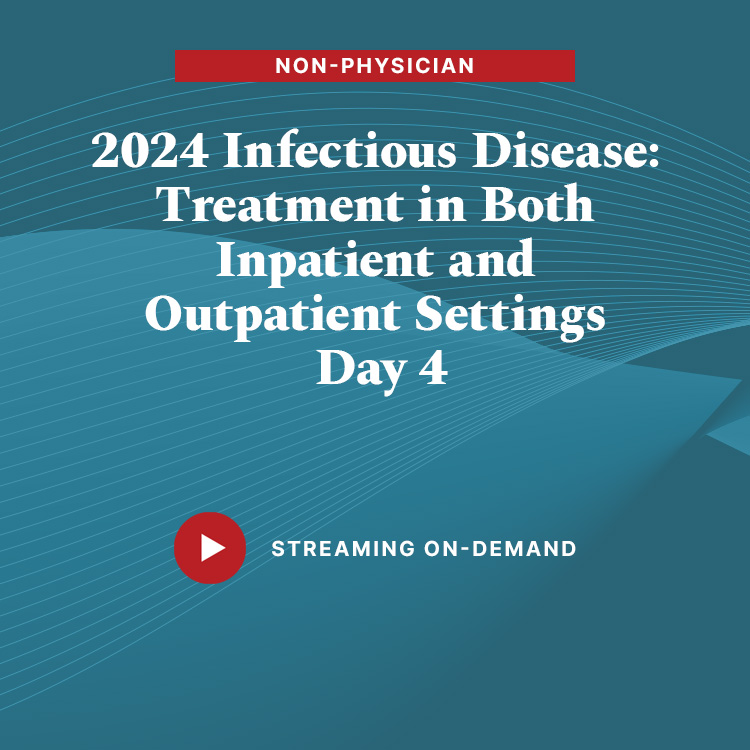Title: 2024 Infectious Diseases: Treatment in Both Inpatient and Outpatient Settings – Day 4 (Non-Physician)
Faculty:Stephen J. Gluckman, M.D., F.A.C.P., F.I.D.S.A.; Valerianna Amorosa, M.D.; Blair C. Weikert, M.D.
Release Date: 7/1/2024 Expiration Date: 7/1/2027
Day 4
Treatment and Evaluation Strategies for Recurrent UTI
Attendees of this presentation will be able to:
- Identify patient risk factors that can lead to recurrent UTI and how to modify them
- Recognize options for prevention of UTI including pharmacologic therapies
Tuberculosis Update
Attendees of this presentation should be able to:
- Appraise how the changing epidemiology of tuberculosis has impacted the incidence of the disease in the U.S.
- Detect and manage latent tuberculosis infection, including appropriate use of gamma-interferon release assays as per the CDC recommendations and Guidelines.
- Apply the principles of treatment of TB disease, specify how to increase medication adherence, and detect adverse drug reactions.
- Differentiate patient characteristics to anticipate
Sexually Transmitted Diseases
Attendees of this presentation should be able to:
- Relate the present epidemiology of STDs in this country.
- Develop a differential diagnosis and a diagnostic and treatment approach for the following STD syndromes based on CDC guidelines: Urethritis; Vaginitis; Genital ulcer(s).
- Specify the diagnosis and management of syphilis, gonorrhea, chlamydia, herpes simplex, and HPV.
- Relate the proper use of a condom so that they may properly educate patients.
The Alphabet Soup of Viral Hepatitis
Attendees of this presentation should be able to:
- Compare and contrast viral hepatitis A through E. Similarities and differences will be stressed, particularly the risks of developing chronic infection and the complications of chronic infection.
- Distinguish the significant features of hepatitis A through E and interpret the various hepatitis serologies.
- Select appropriate patients for treatment.
- Established and new treatment options will be covered as per the CDC and USPSTF Guidelines.
- Select appropriate strategies and options for patients to prevent the acquisition of hepatitis.
What Every Primary Care Provider Should Know About HIV
Attendees of this presentation should be able to:
- Relate the present epidemiology of HIV.
- Develop an up-to-date understanding of the prognosis for a newly infected person.
- Assess the major viral and host factors that determine the present approach to the management of a person infected with HIV as per the NIH, CDC & IDSA Guidelines.
- Determine risk to health care workers and develop a plan to manage an exposed health care worker as per the current CDC and USPSTF Guidelines
- The receipt for any incentive-associated purchase will designate the value of the gift card separately from the cost of the learning activity.
- This incentive may have implications on your tax reporting obligations. Any reimbursed amount must be declared as personal income for tax purposes.

